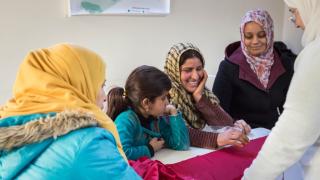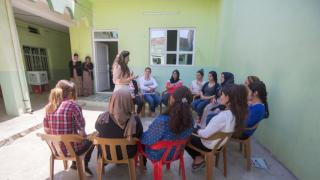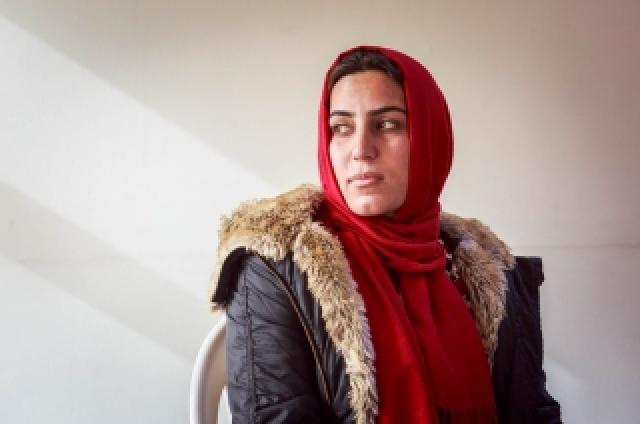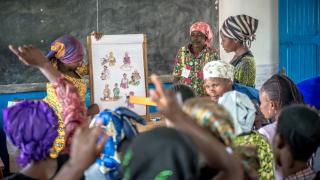A decade of transformation for Yazidi women but the Trauma continues
A decade of transformation for Yazidi women but the Trauma continues
As we approach the tenth anniversary of the Yazidi genocide, we reflect on the remarkable journey of Yazidi women in our Stronger Women, Stronger Nations programme
The Yazidi genocide began on 3rd August, 2014, when ISIS invaded the Sinjar region of Iraq, bringing death, captivity and horrific acts of violence to approximately 400,000 Yazidi men, women and children. Men were forced to choose between death or religious conversion, while women were forcibly converted, taken captive, sold and subjected to sexual enslavement. Over 6,000 Yazidi women and children endured this brutal cycle of captivity, with violence used as a weapon to destroy their community. The trauma inflicted was designed to be irreversible, ensuring that the Yazidi identity was targeted for eradication.
Despite these unimaginable horrors, Yazidi women have demonstrated immense strength and bravery. For Women for Women International’s Programme Officer, Khalida Khalo Lazgeen, who is Yazidi, the pain is still very real. She was a young woman when ISIS fighters came within a few miles of her village and she says her family knew what would happen if they were caught.
When ISIS came to Iraq, my family gave all of us girls a knife and told us that if we were captured, we should kill ourselves.
Grateful that she ultimately escaped capture, Khalida supports other women from the Yazidi community currently in camps in the Kurdistan region of Iraq through our Stronger Women, Stronger Nations programme.

Since its inception, 24,726 women have graduated from the Stronger Women, Stronger Nations programme in Iraq, including many Yazidi survivors. These women have gained knowledge on how to become financially independent and developed an understanding of their rights and crucial health information. This progress is significant in a context where historically women’s voices have been silenced and opportunities were scarce.
Khalida shares: “A few years ago, I approached some women who lived in my neighbourhood to tell them about Women for Women International and the opportunities available. They adamantly refused to join and said their husbands would not allow it. But after a three-year presence in the community, a group of women recently knocked on our centre’s doors asking to be enrolled in the programme. This made me happy, to see the women excited to enrol and how Women for Women International has influenced the community.”
The impact of the programme extends beyond vocational training. It has created a safe space for women to connect, share their experiences and support one another. Khalida notes,
I really see the change among the women...the way they are connected to each other, the support they provide, they feel it is a home.

The courage it takes for these women to join the programme, often alongside those they once viewed as adversaries, is immense. Yet, they emerge from the programme confident, self-reliant and equipped with skills to lead their households and advocate for their rights.
The Stronger Women, Stronger Nations programme has not only transformed their lives but also the community's perception of women’s roles.
For Khalida, her role is deeply personal. As a mother to a young daughter, she envisions a future where her daughter and all women can follow their hearts, speak up and support one another.
Khalida’s dedication to the cause is unwavering. “As a woman, I see the power in myself. I want to use my power to support women whose voices are unheard, women who are afraid to speak up and women who want to go out and start their businesses and be part of the community."
I will use my voice to raise their voices.
The Current Situation
As we look to the future, the challenges remain daunting. The Yazidi people, now being forced back into Sinjar by the Iraqi government, return to a homeland ravaged by conflict and devoid of basic necessities like clean water.
The planned closure of displaced people’s camps in the Kurdistan Region of Iraq by a 30th July deadline will imperil the rights of many camp residents from the northern Sinjar district. Sinjar remains unsafe and lacks adequate social services to ensure the economic, social and cultural rights of thousands of displaced people who may soon be forced to return. The Iraqi Ministry of Migration and Displacement announced this deadline in January 2024.
One woman from a camp about to be closed told Women for Women International, “I feel sad and hopeless. Eventually, we would like to return home, but we are still psychologically traumatised. There is no infrastructure, no job opportunities and no security in Sinjar."
The tenth anniversary of the Yazidi genocide is a time of reflection and remembrance, but also a time to raise awareness of the current issues faced by Yazidi women and others who continue to be internally displaced. We must advocate for safe, voluntary and dignified returns to Sinjar, ensuring that the necessary infrastructure and services are in place to support the community. Now is the time to act and support the Yazidi women and their families rebuilding their lives, ensuring a future where they can thrive in their place of origin.
Read more
Our Couples Connect pilot sessions are helping men and women work together and ensure a better future for their families. Read Betty and Mawa's stories.
The Stories Behind the Statistics
subtitle:
Behind every number is a human being - with hopes, dreams and fears. This World Refugee Week, learn and share the stories of three brave women.
The women we serve are all survivors of war or conflict – but far too many have survived violence against women as well. Despite the trauma, they continue to push for change. They rebuild their lives while working towards a brighter future for their children, and many become activists to drive wider, long-lasting change for their communities. In this blog we share the stories of five women, Nabintu from the Democratic Republic of the Congo, Mila from Ukraine and Grace, Hadiza and Joyce from Nigeria.



